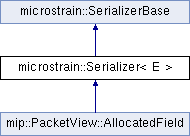|
| template<typename... Ts> |
| bool | insert (const Ts &... values) |
| | Serializes one or more values. More...
|
| |
| template<typename... Ts> |
| bool | extract (Ts &... values) |
| | Deserializes one or more values. More...
|
| |
| template<class T , class S > |
| bool | extract_count (T &count, S max_count) |
| | Deserializes an integer with maximum permissible value. More...
|
| |
| template<class T , class S > |
| bool | extract_count (T *count, S max_count) |
| |
| | SerializerBase ()=default |
| |
| | SerializerBase (uint8_t *ptr, size_t capacity, size_t offset=0) |
| |
| | SerializerBase (const uint8_t *ptr, size_t size, size_t offset=0) |
| |
| | SerializerBase (microstrain::Span< const uint8_t > buffer, size_t offset=0) |
| |
| | SerializerBase ()=default |
| |
| | SerializerBase (uint8_t *ptr, size_t capacity, size_t offset=0) |
| |
| | SerializerBase (const uint8_t *ptr, size_t size, size_t offset=0) |
| |
| | SerializerBase (microstrain::Span< const uint8_t > buffer, size_t offset=0) |
| |
| uint8_t * | pointer (size_t required_size) |
| | Obtains a pointer to the current offset for reading/writing a value of the specified size. This function does NOT advance the offset value. Generally, you should use getPtrAndAdvance() instead. More...
|
| |
| uint8_t * | getPtrAndAdvance (size_t size) |
| | Obtains a pointer to the current offset for reading/writing a value of specified size, and post-increments the offset by that size. Use this function just like pointer(). More...
|
| |
| void | invalidate () |
| | Marks the buffer as invalid, i.e. overrun/error state. All further accesses via pointer(), getPtrAndAdvance(), etc. will fail. (basePointer() and capacity() remain valid) More...
|
| |
| size_t | setOffset (size_t offset) |
| | Sets a new offset and returns the old value. This can be used to save/restore the current offset. Calling setOffset() after an overrun with an in-range (i.e. non-overrun) value restores the non-overrun status. More...
|
| |
template<serialization::Endian E>
class microstrain::Serializer< E >
Serializes or deserializes data to/from a byte buffer.
Create one of these to handle serialization or deserialization of one or more values to/from a buffer of bytes.
You can use this->insert/extract or directly call the insert/extract non- member functions taking a serializer reference.
The endianness is included as part of the Serializer's type so that it doesn't have to be repeatedly re-specified. It is not included as a runtime parameter for performance reasons (most of the time only a buffer of a known, specific endianness is required).
- Template Parameters
-
| E | Endianness of the target buffer. |
template<serialization::Endian E>
template<class T , class S >
Deserializes an integer with maximum permissible value.
This function is intended to be used with protocols which have embedded length fields. This function returns false and invalidates the serializer if the count is too large.
- Template Parameters
-
| T | Type of value to read. Expected to be integer-like and must support bool operator<=(S). |
| S | Type of the maximum value. Usually the same integral type as T, but the only requirement is that it can be compared with T. |
- Parameters
-
| [out] | count | Value read from the buffer. Set to 0 on failure. |
| max_count | Maximum permissible value for count (inclusive). |
- Returns
- True if the count was successfully read and is less than or equal to max_count.

 Public Member Functions inherited from microstrain::SerializerBase
Public Member Functions inherited from microstrain::SerializerBase 1.8.17
1.8.17